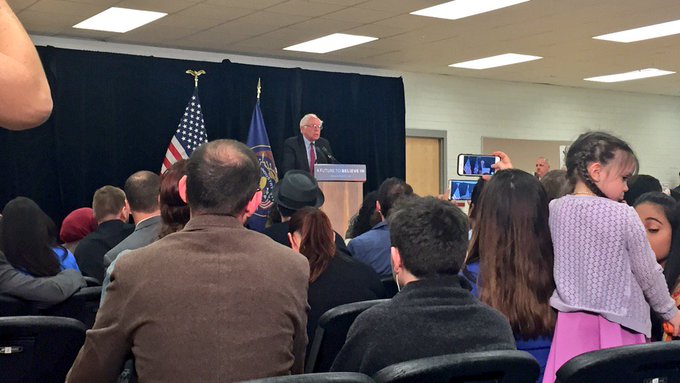Why the Election Was Stolen From Bernie Sanders
Bernie Sanders Delivered A Killer AIPAC Speech … In Utah
The pro-Israel group wouldn’t have liked what he said.


Sen. Bernie Sanders (I-Vt.) declined to speak at the country’s largest pro-Israel gathering in Washington on Monday. Instead, the Democratic presidential candidate, who is the only Jew in the race, gave a speech detailing his belief in a two-state solution to the Israeli-Palestinian conflict — in Utah.
But then the speech he gave would have ruffled feathers before the approximately 18,000 attendees at the annual conference of the American Israel Public Affairs Committee. The people gathered at a high school in Salt Lake City were at least his supporters.
AIPAC had invited Sanders and his rival for the Democratic nomination, former Secretary of State Hillary Clinton, to speak. The group also invited businessman Donald Trump, Texas Sen. Ted Cruz and Ohio Gov. John Kasich, the three remaining Republican presidential hopefuls.
Sanders was the only candidate to decline the invitation, citing scheduled campaign events in Idaho, Utah and Arizona, which host their respective caucuses and primary on Tuesday. (He did request to address the conference remotely, which the group decided wasn’t kosher.)View image on Twitter


.@BernieSanders delivers the speech he would have given at AIPAC today on international relations and Israel. 813:35 PM – Mar 21, 201667 people are talking about thisTwitter Ads info and privacy
Presidential candidates who come to AIPAC tend to emphasize their “unwavering commitment” to Israel’s security, with some warm anecdotes thrown in about past visits to the country and how much they loved it. The candidates this year, including Clinton, spent a large portion of their speeches talking about the Iranian nuclear deal, which AIPAC had tried unsuccessfully to torpedo.
Most White House hopefuls don’t say what Sanders did in Utah, which is that Israel’s government should get serious about a two-state solution to the Israeli-Palestinian conflict.
“We are obligated to speak the truth as we see it, and that is what real friendship demands, especially in difficult times,” Sanders said. “It is important among friends to be honest and truthful about differences we may have.”
While Sanders declared his support for Israel’s continued existence as a Jewish state, he also talked about Palestinian unemployment and poverty.
“When we talk about Israel and Palestinian areas, it is important to understand that today there is a whole lot of suffering among Palestinians and that cannot be ignored,” he said.Subscribe to the Politics email.How will Trump’s administration impact you?
Clinton had mentioned the sensitive issue of Israeli settlements just once in her speech to AIPAC on Monday morning. In contrast, Sanders spent significant time condemning construction of the settlements as counter-productive to the currently nonexistent peace process. He said that peace would require “compromises on both sides.”
He called it “absurd for elements in [Israeli Prime Minister Benjamin] Netanyahu’s government to say that building more settlements in the West Bank is the appropriate response” to the most recent round of violence in the country. He argued that new settlement construction ultimately undermines Israeli security and predicted that Israel would have to pull back settlements in the West Bank, “just as it did in Gaza.” And he criticized Netanyahu’s government for withholding tax revenue it collects on behalf of the Palestinian Authority.
This is a stronger position against settlements than that of most American political leaders, who talk about Israel swapping land with the Palestinians to compensate for some large settlement blocs in the West Bank that most assume would remain in Israel’s control under a two-state solution.
Sanders did not explicitly lay out the parameters for what a two-state solution should look like. But he said that Hamas and Hezbollah would have to “renounce efforts” to undermine Israel’s security and that he’d require “the entire world” to recognize Israel’s right to exist. He also said that Israelis should feel secure from violence and terrorism, while Palestinians should have self-determination and civil rights. He argued in favor of ending the economic blockade of Gaza.
The senator implicitly criticized AIPAC for lobbying against the Iran nuclear agreement last year.
“I do not accept the idea that the pro-Israel position was to oppose the deal,” he said. “Preventing Iran from getting a nuclear weapon will strengthen not only America’s security, but Israel’s security as well.”
In yet another line that presidential candidates don’t tend to take before the AIPAC crowd, Sanders called on Israel to end “disproportionate responses” to attacks — though he said any attack launched against Israel is “unacceptable.”
Sanders condemned indiscriminate rocket fire from Hamas into Israel proper. But he also mentioned that he had spoken out “strongly against the Israeli counter-attacks that killed nearly 1,500 civilians and wounded thousands more” when Israel responded to rocket attacks by invading Gaza in 2014.
“It is clear to me that the path to peace will require tapping into our shared humanity to make hard but just decisions,” he said, concluding the Israel-related section of a speech that also touched on the self-described Islamic State and civil war in Syria.
Sanders’ speech would have made quite a statement at AIPAC, which places more of an emphasis on American-Israeli security cooperation and ignores the settlements issue.
But he didn’t seem to want even his supporters to know he was giving a speech on foreign policy, although he had long promised one. His campaign tweeted about it just once while he was delivering his remarks, after sending a link to watch it live.
Do you have information you want to share with HuffPost? Here’s how.
BEFORE YOU GO
PHOTO GALLERYIsraeli Election 2015

Samantha LachmanStaff Reporter, The Huffington PostSuggest a correction

 @DannyEFreeman
@DannyEFreeman














1 Response
[…] Why the Election Was Stolen […]